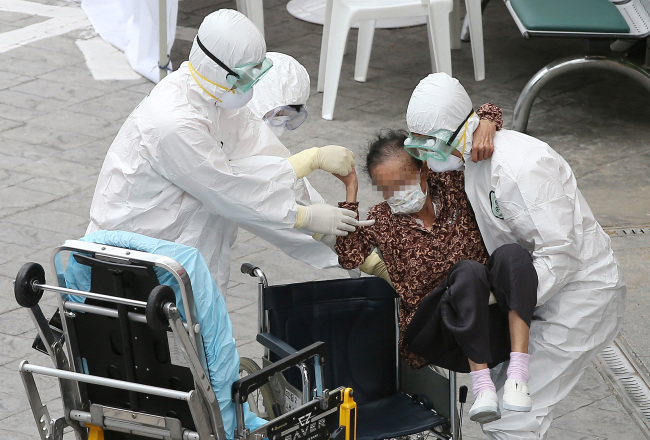A caregiver who had not been informed about her exposure to Middle East respiratory syndrome virus died just two days after her official MERS diagnosis on Wednesday, raising questions once again about the government’s handling of the outbreak.
Her death was one of two reported by Seoul on Thursday, raising the nation’s death toll to 29 and the fatality rate of the disease to 16.1 percent. Health authorities also confirmed one new case at a Busan-based hospital, bringing the total number of MERS cases to 180.
The late caregiver -- the nation’s 173rd MERS case -- is believed to have been exposed to the virus on June 5, when she accompanied her client to Kyung Hee University Hospital at Gangdong in Seoul, where the 76th MERS patient was staying at the time.
The 70-year-old, however, had never been informed about the exposure by the authorities, and therefore was never put under quarantine.
 |
Health care workers carry a suspected MERS patient at the Kyung Hee University Hospital at Gangdong in Seoul on Thursday. (Yonhap) |
She started experiencing MERS symptoms on June 10, and visited a number of medical facilities in Gangdong district of Seoul, including am otolaryngology clinic, before she was hospitalized at the Hallym University Medical Center in Seoul on June 18. By that time, she had already developed pneumonia, a disease that can seriously deteriorate a MERS patient’s condition.
She was eventually admitted to the hospital’s intensive care unit on June 20, and was officially diagnosed with MERS on June 22. She died on Wednesday, just two days after she learned of her MERS infection.
Critics say the late caregiver could have been able to recover from the disease if she had been diagnosed earlier, especially since she did not have any preexisting medical conditions. Margaret Chan, the director-general of World Health Organization, stressed the importance of early diagnosis and treatment of MERS last week.
“It is important for us to know that early treatment, you know, present yourself early during illness, would give you a better chance and better prospect for survival,” she told reporters in Seoul.
The Health Ministry explained that the late patient’s client, who was treated at Kyung Hee University Hospital at Gangdong’s emergency unit on June 5, did not report her caregiver’s visit to the facility to authorities.
“Because the client never told us, she didn’t learn about the late patients’ existence until later,” said Jeong Eun-kyung from Centers for Disease Control and Prevention at the Health Ministry.
“The client said she didn’t say anything about who accompanied her to the hospital, because she ‘simply assumed her caregiver would be all right as she had always been healthy.’ We acknowledge that we should have handled the particular situation earlier, but such circumstances made it difficult.”
In order to prevent such cases from happening again, the Health Ministry said it will make it mandatory for medical facilities to keep a record of all visitors to their emergency care units, including those who accompany the patients, starting Thursday.
Authorities predict that some 2,135 people may have been exposed to the virus as the 173rd patient visited numerous medical facilities while showing MERS symptoms before being hospitalized.
They are urging those who visited the Hallym University Medical Center in Seoul from May 17-22, Mok Cha-su internal medicine clinic (223 Sangil-dong, Gangdong-gu, Seoul) from June 10-11, Bon otolaryngology clinic (391 Godeok-ro, Gangdong-gu, Seoul) on June 15 and Gangdong neurosurgery clinic (45-24 Myeongil-dong Gangdong-gu, Seoul) on June 16 to let their doctors know that they may have been exposed to the virus should they seek medical help for any symptoms or diseases.
The individuals are also asked to report to the authorities immediately should they experience MERS-like symptoms, including a high fever, coughing or shortness of breath, by calling 120 or contacting the nearest public health center.
As of Thursday afternoon, 77 patients were being treated at hospitals, while 15 of them were in unstable condition. Seven more people had been discharged from medical facilities on the same day, raising the number of recovered patients to 74. Some 90 hospitals nationwide have been affected by the outbreak.
Among the 180 confirmed patients, 34 of them are health care workers, 64 are those who visited inpatients in medical facilities and 82 are those who were exposed to the virus while being treated for their preexisting medical conditions at hospitals.
The largest portion of them -- 21.7 percent -- are in their 50s, followed by those in their 60s and 70s.
By Claire Lee (
dyc@heraldcorp.com)







![[Today’s K-pop] Blackpink’s Jennie, Lisa invited to Coachella as solo acts](http://res.heraldm.com/phpwas/restmb_idxmake.php?idx=644&simg=/content/image/2024/11/21/20241121050099_0.jpg)
